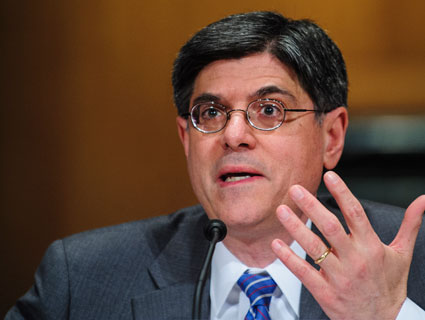
Pete Marovich/ZUMAPress
The House Financial Services Committee (HFSC) plans to vote on nine separate bills this week that have been presented as technical fixes to the sweeping 2010 Dodd-Frank Wall Street Reform and Consumer Protection Act. But these measures have the potential to dramatically weaken the legislation, which was designed to prevent another financial crisis a la 2007. Now Treasury Secretary Jack Lew has weighed in, condemning the measures in a letter to HFSC chair Rep. Jeb Hensarling (R-Texas).
“The derivatives provisions in the Wall Street Reform Act constitute an important part of the reforms being put into place to strengthen our financial system by improving transparency and reducing risk for market participants,” Lew wrote in the letter. (Derivatives are financial products that have values based on underlying numbers, like crop prices or interest rates; some economists believe these products helped cause the 2007 financial collapse.) “These reforms should not be weekend or repealed.”
Lew had, up until now, been silent on this set of bills. As I reported last month, former Treasury Secretary Tim Geithner slammed a series of nearly identical bills last year, but Lew had so far declined to address the latest proposed changes. After our story ran, a Treasury spokeswoman reached out to clarify that, “Of course the Treasury secretary would oppose any effort to weaken Wall Street reform,” and pointed to Lew’s previous public statements opposing efforts to undermine Dodd-Frank or delay its implementation.
Monday’s letter put that promise into action. “I urge Members to oppose these bills and others like it that would weaken the important regulatory changes that Wall Street Reform has made to the derivatives market,” he wrote. He added that only some of the rules governing the derivatives market have been finalized, so these bills are “premature”:
Regulators are already addressing many of the issues presented in these bills through their rule makings. In many instances, legislation is premature and aspects would be disruptive and harmful to the implementation of key reforms. We should allow the regulators to complete their ongoing rule makings, and then determine what changes, if any, might be necessary in certain areas to improve the effectiveness of these reforms.
One of the bills before the committee this week would allow certain derivatives that are traded within a corporation to be exempt from almost all new Dodd-Frank regulations. Financial reform advocates say these kinds of trades can still pose a risk to the wider financial system. Another measure would expand the type of trading risks that banks can take on. A third bill would allow big, multinational US-based banks to escape US regulations by operating through international arms.
While some Democrats in the committee share Lew’s concerns about the measures, the bills do have bipartisan support. It is unclear whether the bills will pass. House Financial Services Committee members received some $14.8 million in contributions from the financial services and banking sectors during the last election cycle. This week, we will see where members’ loyalties lie.








